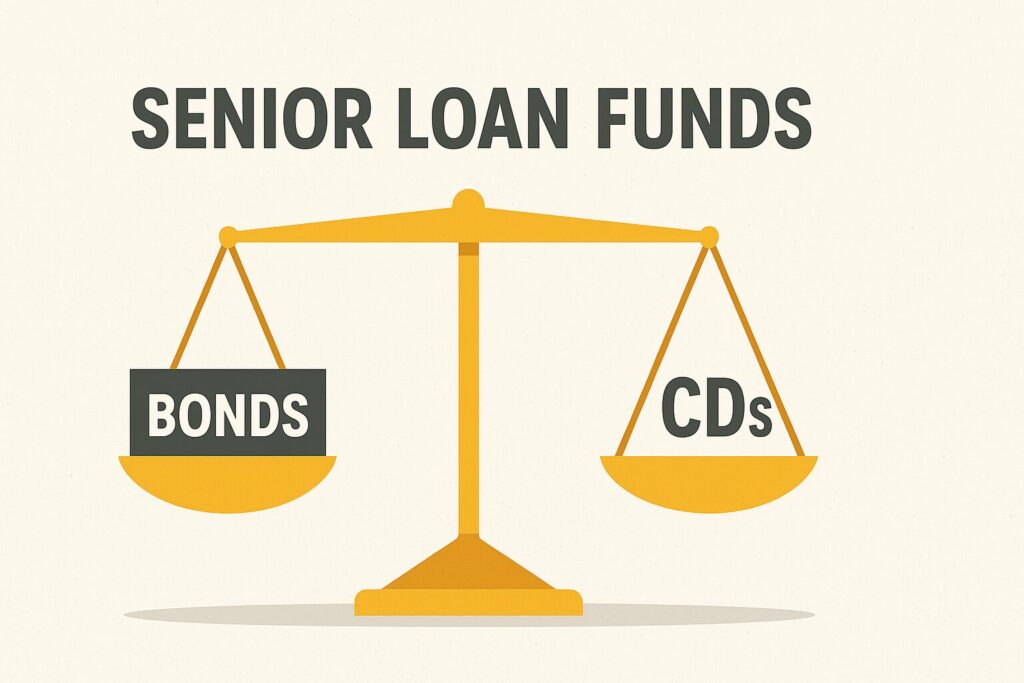
Which Income Investment Is Right for Retirees?
As a retiree, you’re likely looking for one thing above all in your investments: steady, reliable income. Bonds and CDs have long been go-to choices for retirees seeking safety—but in today’s income-hungry world, many are also turning to senior loan funds to boost their yields.
But how do senior loan funds really compare to traditional options like bonds and CDs? Are they safe? What are the risks? And can they be a smart addition to your retirement portfolio?
Let’s break it down in plain English.
📘 What Are Senior Loan Funds?
Senior loans—also called bank loans or leveraged loans—are loans made to companies, typically with below-investment-grade credit, that are secured by the company’s assets and sit at the top of the repayment list in case of bankruptcy. They’re called “senior” because they take priority over other debts.
Senior loan funds, whether structured as mutual funds, ETFs, or closed-end funds (CEFs), invest in these loans and pay out monthly or quarterly income to investors.
💼 How Senior Loan Funds Compare to Bonds
1. Credit Quality
- CDs: Backed by FDIC insurance up to $250,000—essentially risk-free.
- Bonds: Investment-grade corporate or U.S. Treasury bonds are relatively safe, while high-yield (junk) bonds carry more credit risk.
- Senior Loans: Often issued to companies with lower credit ratings, but secured by collateral, making them less risky than high-yield bonds in some cases.
Takeaway: Senior loans are not as safe as CDs or Treasuries but may be safer than unsecured junk bonds.
2. Interest Rate Sensitivity
- CDs and Bonds: Prices usually fall when interest rates rise.
- Senior Loans: Typically have floating interest rates that adjust with rising rates, making them more resistant to rate risk.
Takeaway: Senior loans can help protect your portfolio in rising rate environments.
3. Income/Yield
- CDs: Yields fluctuate with short-term interest rates. Safe but often low.
- Bonds: Investment-grade bonds may yield 3–5%. Junk bonds yield more, but with more risk.
- Senior Loan Funds: Can yield 6–10% or more, especially in closed-end fund form.
Takeaway: Senior loan funds can offer significantly higher income than CDs or investment-grade bonds.
4. Liquidity
- CDs: Generally must be held to maturity unless you’re willing to pay a penalty.
- Bonds: Tradable but can have wider spreads and less liquidity.
- Senior Loan Funds: Highly liquid if held via an ETF or mutual fund. Closed-end funds trade like stocks.
Takeaway: Senior loan funds are more liquid than CDs and similar to bond funds in accessibility.
5. Risk and Volatility
- CDs: No volatility.
- Bonds: Can fluctuate in value, especially with interest rate or credit risk.
- Senior Loans: Can be volatile, especially during economic downturns or credit events.
Takeaway: With higher yield comes higher risk. Senior loan funds can lose value in a downturn, though they typically recover if defaults remain low.
🧓 A Real-Life Example: Paul’s Retirement Income Boost
Paul, a 70-year-old retiree, had $300,000 in CDs earning 3%. After inflation and taxes, he was barely staying ahead. He decided to move $100,000 into a senior loan closed-end fund yielding 8%, while keeping the rest in safer CDs and short-term bonds.
Now, his blended income yield is around 5.6%—a big improvement.
“I still sleep at night,” he says, “but now I can afford to travel again.”
🔍 Popular Senior Loan Funds to Consider
While individual senior loans are hard to access, there are many professionally managed funds available. Here are a few examples (note: this is not a recommendation):
- BKLN – Invesco Senior Loan ETF
- VVR – Invesco Senior Income Trust (CEF)
- EFT – Eaton Vance Floating Rate Income Trust (CEF)
- PPR – Virtus Credit Opportunities Fund (CEF)
- XFLT – XAI Floating Rate & Alternative Income Term Trust (CEF)
Many of these funds pay monthly and yield 7–10%, but come with varying levels of volatility, fees, and credit risk.
✅ When Do Senior Loan Funds Make Sense?
Senior loan funds can be a smart addition to a retirement portfolio when:
- You want to boost income beyond what CDs and bonds provide.
- You’re concerned about rising interest rates.
- You’re comfortable with some credit risk in exchange for higher yields.
- You diversify with other safer assets (don’t put all your eggs in one basket).
⚠️ When to Avoid Senior Loan Funds
They may not be ideal if:
- You can’t handle market swings.
- You’re very risk-averse and prioritize capital preservation above income.
- You rely on a guaranteed income stream like annuities or pensions and don’t need extra yield.
🔐 Tips for Using Senior Loan Funds Safely
- Diversify – Don’t go all-in. Use senior loans as a complement to safer fixed income.
- Choose well-managed funds – Stick with funds that have a track record of managing credit risk wisely.
- Watch premiums/discounts – For closed-end funds, make sure you’re not paying a steep premium.
- Know your income source – Some funds may use return of capital. Understand where your income is coming from.
- Monitor credit markets – Stay informed about economic shifts that could impact loan defaults.
🏁 Final Thoughts
Senior loan funds can fill a valuable niche in a retiree’s income strategy. With higher yields, floating rates, and collateral-backed loans, they offer a unique way to fight inflation and earn more—if you’re willing to accept a bit more risk.
They’re not for everyone, but when used wisely alongside more conservative investments like CDs, Treasuries, and bonds, they can enhance your retirement paycheck without jeopardizing your peace of mind.
📘 This post was adapted from my book:
The 8% Solution: Double Your Retirement Income with High-Yield Closed-End Funds
Available now at Amazon.com in paperback and eBook formats.
Disclaimer: This article is for informational purposes only and does not constitute financial, investment, or tax advice. All investments carry risk, and past performance is not a guarantee of future results. Please consult a qualified financial advisor before making any investment decisions.